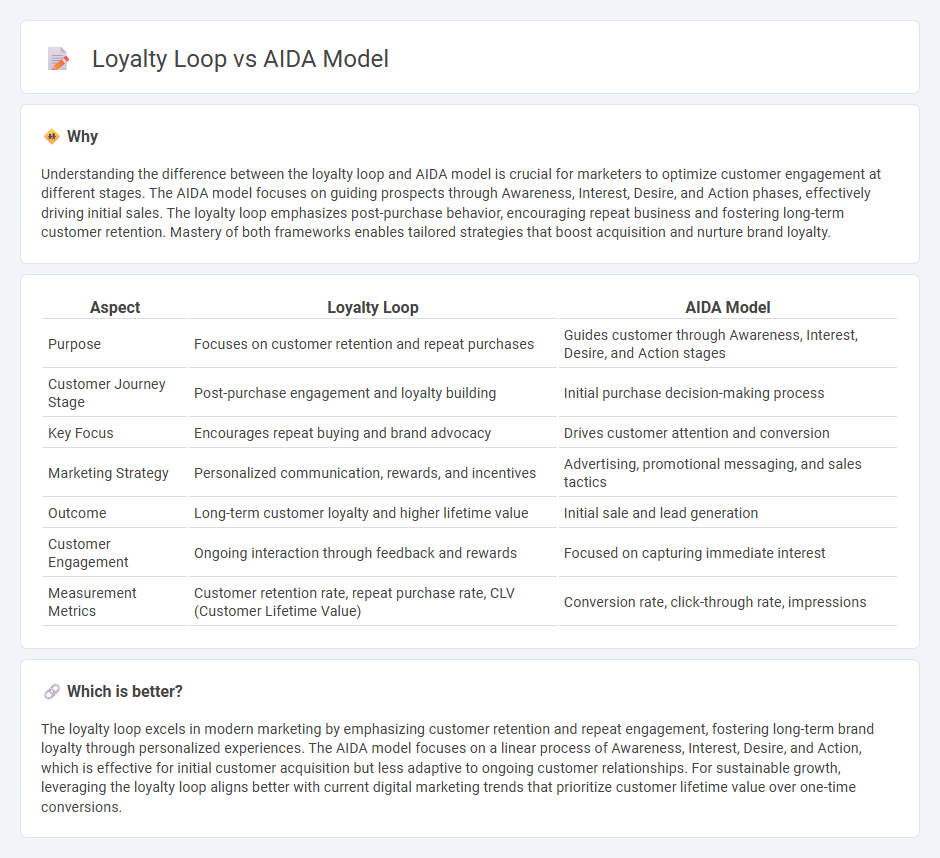
The loyalty loop model emphasizes customer retention and repeat purchases by fostering long-term relationships, contrasting with the AIDA model that focuses on guiding potential customers through Awareness, Interest, Desire, and Action stages to initiate a purchase. Marketing strategies leveraging the loyalty loop prioritize personalized engagement and customer satisfaction to drive brand loyalty, while AIDA centers on effective communication and persuasion during the acquisition phase. Explore the differences and applications of these models to enhance your marketing effectiveness.
Why it is important
Understanding the difference between the loyalty loop and AIDA model is crucial for marketers to optimize customer engagement at different stages. The AIDA model focuses on guiding prospects through Awareness, Interest, Desire, and Action phases, effectively driving initial sales. The loyalty loop emphasizes post-purchase behavior, encouraging repeat business and fostering long-term customer retention. Mastery of both frameworks enables tailored strategies that boost acquisition and nurture brand loyalty.
Comparison Table
| Aspect | Loyalty Loop | AIDA Model |
|---|---|---|
| Purpose | Focuses on customer retention and repeat purchases | Guides customer through Awareness, Interest, Desire, and Action stages |
| Customer Journey Stage | Post-purchase engagement and loyalty building | Initial purchase decision-making process |
| Key Focus | Encourages repeat buying and brand advocacy | Drives customer attention and conversion |
| Marketing Strategy | Personalized communication, rewards, and incentives | Advertising, promotional messaging, and sales tactics |
| Outcome | Long-term customer loyalty and higher lifetime value | Initial sale and lead generation |
| Customer Engagement | Ongoing interaction through feedback and rewards | Focused on capturing immediate interest |
| Measurement Metrics | Customer retention rate, repeat purchase rate, CLV (Customer Lifetime Value) | Conversion rate, click-through rate, impressions |
Which is better?
The loyalty loop excels in modern marketing by emphasizing customer retention and repeat engagement, fostering long-term brand loyalty through personalized experiences. The AIDA model focuses on a linear process of Awareness, Interest, Desire, and Action, which is effective for initial customer acquisition but less adaptive to ongoing customer relationships. For sustainable growth, leveraging the loyalty loop aligns better with current digital marketing trends that prioritize customer lifetime value over one-time conversions.
Connection
The loyalty loop enhances the AIDA model by extending customer engagement beyond the purchase stage, focusing on retention and repeat business. While the AIDA model guides prospects through Awareness, Interest, Desire, and Action, the loyalty loop emphasizes post-purchase satisfaction and advocacy to create long-term brand loyalty. Integrating these models optimizes marketing strategies by converting one-time buyers into loyal customers who continuously engage with the brand.
Key Terms
AIDA Model:
The AIDA model, consisting of Attention, Interest, Desire, and Action, is a foundational framework in marketing that guides potential customers through the purchasing process by capturing awareness and progressively building engagement. Unlike the loyalty loop, which emphasizes post-purchase retention and repeat business, the AIDA model focuses on the initial stages of customer acquisition and conversion. Explore how mastering the AIDA model can enhance your marketing strategies for driving new customer growth.
Attention
The AIDA model emphasizes capturing consumer Attention as the initial step toward driving purchase decisions, using clear messaging and targeted outreach to engage potential customers. In contrast, the Loyalty Loop prioritizes sustaining Attention through ongoing brand interactions that foster emotional connections and encourage repeat business. Explore how these frameworks uniquely approach Attention to enhance marketing effectiveness.
Interest
The AIDA model emphasizes Interest as the stage where consumers engage with product information, shaping their desire through attention and evaluation. In contrast, the Loyalty Loop centers Interest around ongoing engagement post-purchase, fostering deeper brand connection and repeat behavior. Explore how integrating these approaches enhances customer retention and conversion strategies.
Source and External Links
AIDA Model Explained Including an Example - The AIDA model is a marketing framework that guides customers through stages of Attention, Interest, Desire, and Action, helping businesses craft communications to encourage purchases.
AIDA Marketing Model - The AIDA marketing model describes a buyer's journey through stages of Attention, Interest, Decision, and Action, used to optimize marketing communications at each stage.
AIDA (Marketing) - The AIDA model outlines a consumer's progression from Attention to Interest, Desire, and Action, serving as a foundational framework in advertising and marketing theory.
 dowidth.com
dowidth.com